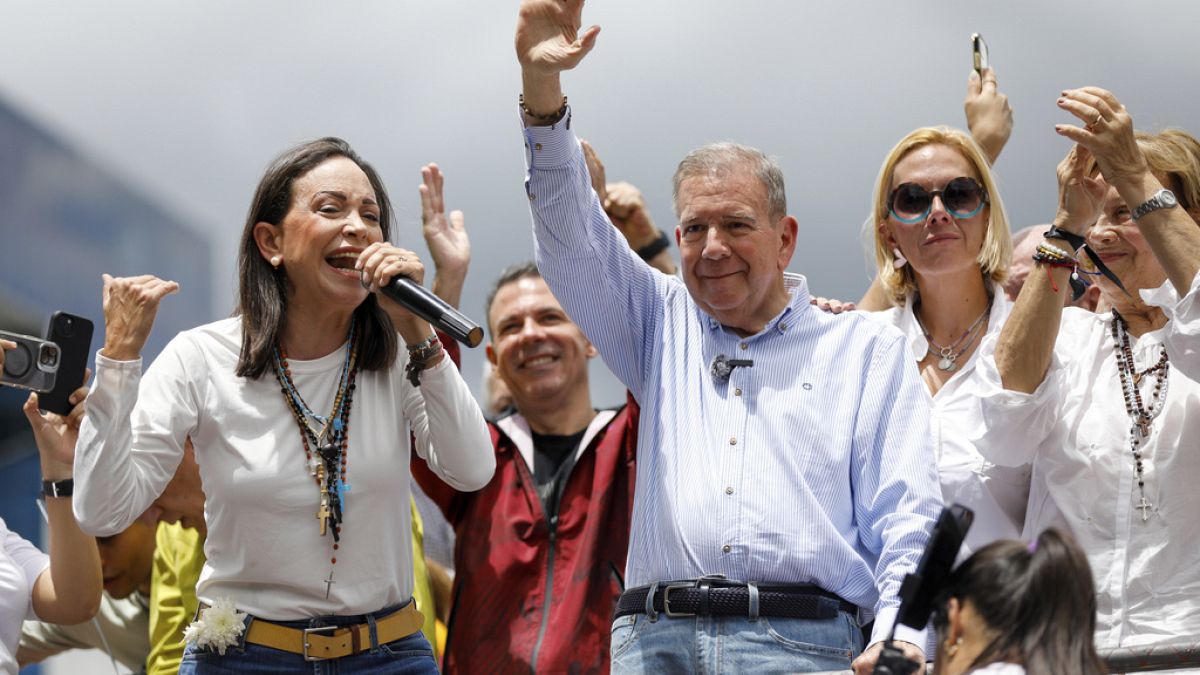Prize-winners underline European Parliament’s tough stance against the presumptive incumbent Venezuelan President Nicolas Maduro, who’s re-election the hemicycle decries as bogus.
María Corina Machado and Edmundo González are the winners of the European Parliament’s Sakharov Prize “for their brave fight to restore freedom and democracy in Venezuela,” backed by centre-right and right-wing groups.
Parliament’s President Roberta Metsola announced the winners on Thursday in Strasbourg, following a meeting of the presidents of the political groups, who made the decision.
Hailing Machado and González for their brave fight to restore freedom and democracy in Venezuela, Metsola added: “In their quest for a fair, free, and peaceful transition of power, they have fearlessly upheld values that millions of Venezuelans and the European Parliament hold so dear: justice, democracy, and the rule of law.”
She also reaffirmed the European Parliament’s commitment to the people of Venezuela and to the two laureates “in their struggle for the democratic future of their country.”
Metsola referred to Edmundo González as “president-elect” following a Parliament resolution that recognised him as such in September. By contrast, the EU recognises neither Nicolás Maduro nor González as the legitimate winner of the election held in July in Venezuela.
Who are the winners?
María Corina Machado is considered the leader of Venezuela’s opposition. She was elected as the presidential candidate on behalf of the Democratic Unitary Platform (PUD) in 2023 but was later disqualified by the National Electoral Council.
Edmundo González, a former diplomat, replaced her as the PUD candidate, challenging Nicolás Maduro in the 28 July vote. Machado and González denounced the Venezuelan government’s failure to publish the official results of the presidential elections and contested Nicolás Maduro’s declared victory, which was also questioned by a United Nations panel of experts.
González fled the country for Spain – which granted him political asylum on 7 September – after a warrant was issued for his arrest, while Machado claims to remain in the country in hiding.
The European Parliament claimed that the Venezuelan presidential election failed to comply with international standards of electoral integrity and condemned alleged “electoral fraud” and the “serious and systematic human rights violations perpetrated against the democratic opposition, the Venezuelan people, and civil society.”
The EU called on the Venezuelan authorities to respect the right of all Venezuelans to peacefully demonstrate, refrain from using excessive force, end the repression of the opposition and civil society, and release all political prisoners. It has also sanctioned several high-ranking Venezuelan officials with restrictive measures, but stopped short of sanctioning Maduro himself.
Second award in recent years for Venezuelan opposition
Machado and González were jointly proffered for the award by the largest group in the European Parliament, the centre-right European People’s Party (EPP), while the European Conservatives and Reformists (ECR) proposed González alone.
The right-wing Patriots for Europe also backed González after its candidate, tech billionaire Elon Musk, was excluded from the shortlist.
Civil society associations “Women Wage Peace” and “Women of the Sun” – respectively from Israel and Palestine – were proffered by the S&D group, while academic and Azerbaijani anti-corruption activist Gubad Ibadoghlu, put forward by the Greens/EFA group, completed the shortlisted candidates.
The Sakharov Prize for Freedom of Thought is awarded to individuals or groups who have dedicated their lives and careers to defending human rights and freedom of thought.
Machado and González succeed Jina Mahsa Amini and the Woman, Life, Freedom Movement in Iran, who were awarded the prize in 2023, while the political opponents of the Venezuelan government, including the National Assembly and all political prisoners, received the prize in 2017.
The award ceremony will take place on 18 December during Parliament’s plenary session.

